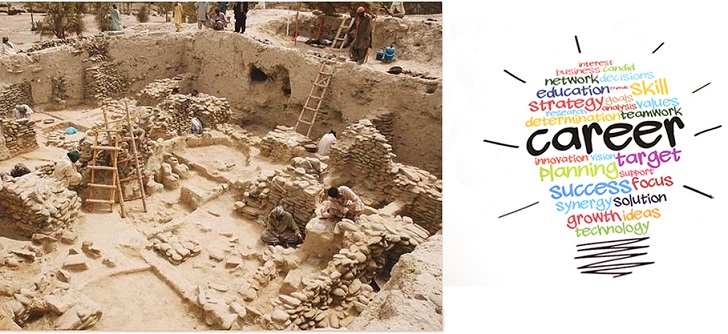As a very diverse field of study with recruitment opportunities in different industries, you may dream of being an archaeologist. Let’s get started with key factors you need to know before you start to pursue your career in archaeology!
What is Archaeology?
In order to analyze human culture, archaeologists study physical and material remains.
Types of Professional Archaeology

There are two main types of archaeology. If you are interested in locating and finding remains, attentively analyzing them in order to understand key cultural processes in human history, you should consider being a historical archaeologist. Some may refer to historical archaeology as anthropological archeology as well. Keep in mind that you could choose between pre-historic and historic or you can study classical and underwater archaeology. Nevertheless, if your passion is towards forensic sciences and if you want to investigate a crime scene in order to play a crucial role to solve the mystery, you should aim to be a forensic archeologist. Archaeology branches are different from one another with one thing in common: It is like being a detective!
Are you a young adult interested in archaeology?
It is never too early to follow your passion! If you are not old enough to go to university, there are several things you might want to try in order to have an understanding of archaeology. Firstly, check Teen&Young Adult Archaeology Books on Amazon to expand your knowledge. Secondly, try to visit archaeological sites and museums. Thirdly, enjoy your science, history, or Latin classes in school. You may benefit from them a lot in your future archaeology career. Lastly, in order to gain experience in excavation, you may try to join archaeological organizations such as Young Archaeologists Club.
Degree in Archaeology
Archaeology is a field combining arts and sciences, so if you want to be a professional historical archaeologist, you need to obtain at least a Bachelor degree. You will take a lot of courses from humanities and social sciences along with conducting fieldwork and constructing databases.
Cappex lists the universities offering archeology Bachelor degrees in The U.S.A. From BachelorsPortal, you can search for other universities all around the world. You may want to check Research Assessment Exercise to evaluate a university. Additionally, check the university website because sometimes it gives enough clues about the quality of the education and you may decide if it is the right place for you based on what they offer. What type of courses do they offer? What is the expertise of academic staff? What additional programs can you benefit from? Do they conduct fieldwork? Finally, you should decide what kind of city you want to live in. Take university campus and living expenses into consideration. Nevertheless, if you want to be a forensic archaeologist you should perhaps attend a criminal justice program. If you are already enrolled in a degree or program, there may be other things to do in order to boost your skills as an archaeologist. Try to find local organizations, subscribe to archaeology magazines, and of course, specialize in something you are truly interested in. Neanderthal diets or intercultural contacts can be given as examples. The last but not the least, love what you do and don’t forget to enjoy it!
Overview of Archaeology as A Professional Career
If you do not want to be just an amateur enjoying his/her passion, but pursue archaeology as a career, here are some important tips for you.
Career Opportunity 1: If you want to be in the field digging and writing excavation reports, your title is an archaeological researcher. If you are interested in supervising the digging, your title is a project manager who functions as a mediator between the employer and researchers. Project managers and researchers are hired by developers to conduct field studies.
Career Opportunity 2: If you want to be a member of academia since you enjoy researching more than being physically in the field, you should pursue an academic career. You need a P.h.D to do so. Keep in mind that most of the current academics are coming up for retirement, so you may have a good chance.
Career Opportunity 3: Do you want to be a civil servant researching, designing displays, or giving lectures? You can work in a museum if you have a Master’s Degree.
Career Opportunity 4: You can work as a consultant and present findings to the public if you are interested in public archaeology. If this is your passion you may need an additional diploma or master’s degree in the following fields: resources management, tourism, acting, media studies, teaching.
How to Get Experience Before Applying For a Job
If you are a new graduate and trying to be accepted from a job, you may focus on gaining experience in the fieldwork. There is an excellent way to do that: Volunteer! You may visit https://www.archaeological.org/programs/professionals/fieldwork/afob/ to see the opportunities or contact your local archaeology organization. Volunteering will contribute a lot to your career, you may make professional connections and boost your CV, for professional contacts check this website https://www.archaeologists.net/.
Platforms To Find A Job
If you are interested in teaching archaeology, share your CV with the archaeology community.
If you want to work in the historical archaeology field, you may want to check https://sha.org/.
Interested in classical archaeology? Check this website to be updated about career opportunities http://careers.archaeological.org/jobs/ .
Don’t forget to get a membership for such societies, because connections mean a lot in this industry.
Earnings
Paid-career in archaeology won’t come to you easily and do not forget that in the beginning, you will be paid far less for so much work. According to Indeed, you may earn between $60.000- $85.000 per year as an archaeologist if you are based in the U.S.A. However, initially do not expect to earn more than $30.000 annually.

